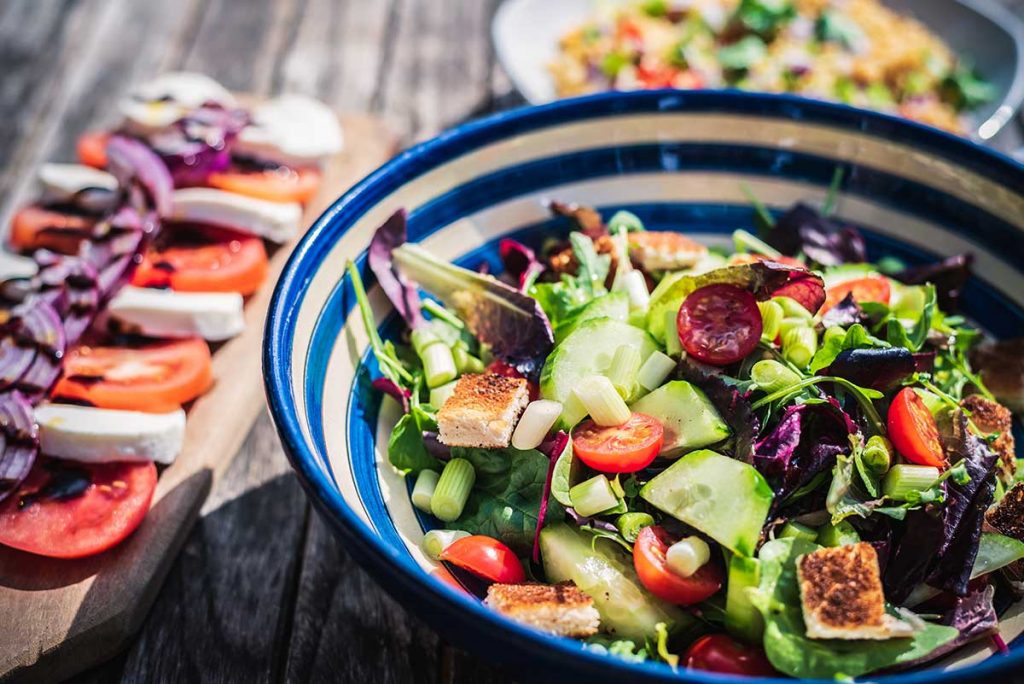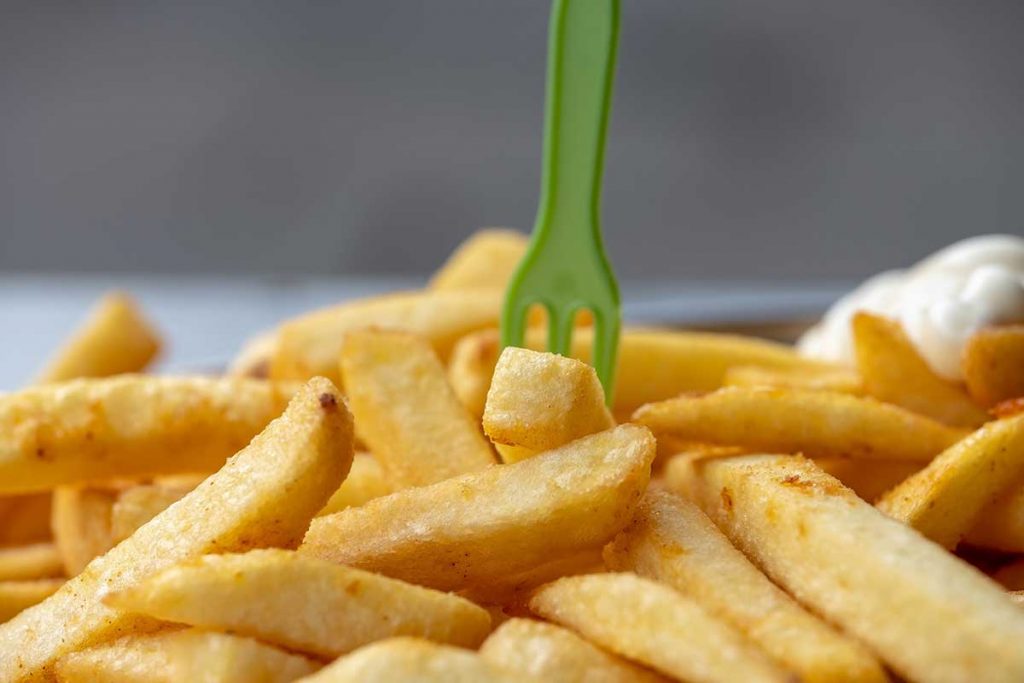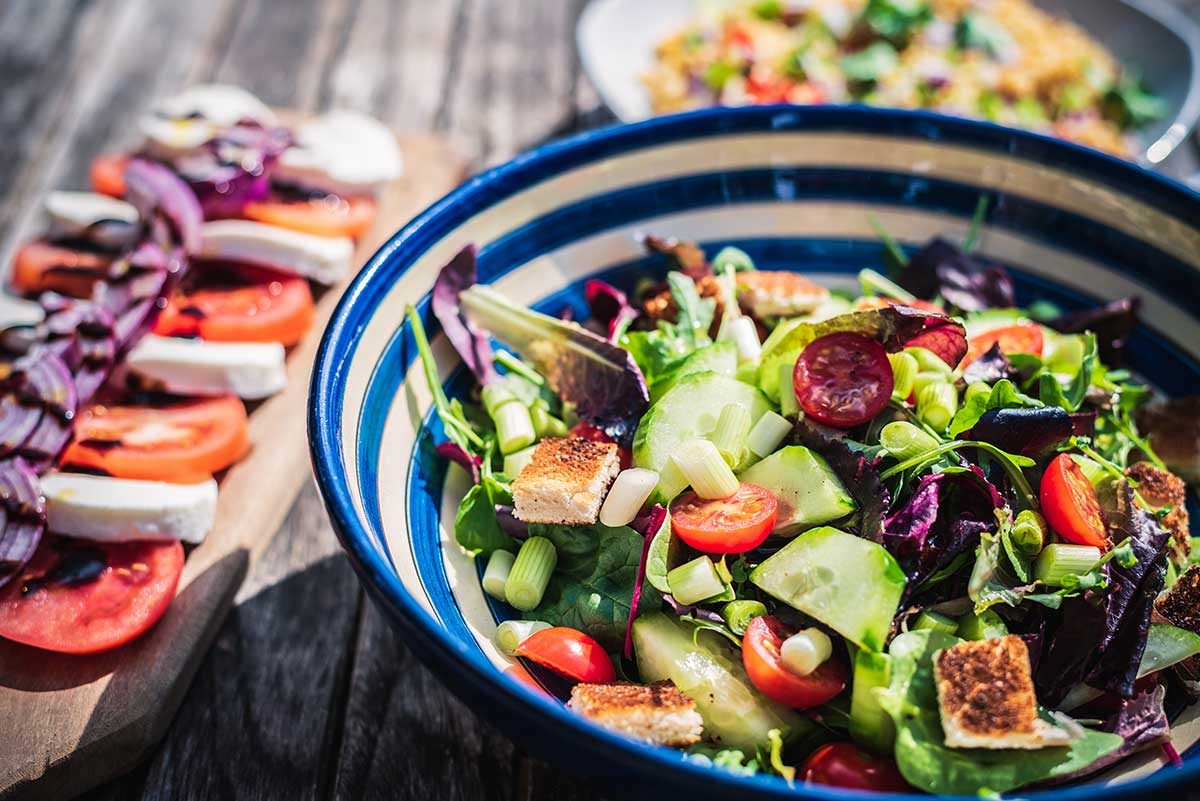
Chronic inflammation develops due to tissue damage resulting from autoimmune disorders such as rheumatoid arthritis and lupus, repeated acute inflammation events and exposure to industrial chemicals. It also develops when the body has difficult repairing itself due to injuries to tissue. Estimated to impact 60 percent of Americans, chronic inflammation can contribute to the development of disease too, including diabetes, heart disease, arthritis and allergies. Keeping inflammation under control as much as possible takes planning and effort, but there are natural ways to lower inflammation through dietary and food choices.
It is important to follow a healthy diet that includes food believed to lower inflammation and avoids food believed to be inflammatory. Developing good lifestyle habits can also play a big role in managing chronic inflammation. Following are some suggestions that describe how to reduce inflammation in the body.
Foods to Eat
Anyone can learn how to lower inflammation because good decisions about food choices is personally controllable. A research study involving senior citizens found that eating fruit and vegetables high in elements like n-3 polyunsaturated fatty acids (PUFA), flavonoids, monounsaturated fatty acids and vitamins E and C can reduce inflammation. Following are some suggestions.
1. Dark green leafy green vegetables
Leafy green vegetables like spinach, kale and collard greens contain are antioxidant rich and have high amounts of beta-carotene.
2. Oily (fatty) fish
Sardines, salmon and mackerel are examples of fish that contain high amounts of omega-3 fatty acids which studies have shown can reduce inflammation.
3. Berries
Richly colored berries like blueberries, strawberries, raspberries, etc. are high in antioxidants that support a healthy immune system.

4. Spices
There are spices that may inhibit some inflammatory pathways, like cinnamon, ginger, garlic, chili peppers and turmeric.
These are not the only foods, of course. Additional foods to add to your diet include cherries, red grapes, plums and onions. These foods contain polyphenols which are natural ways to lower inflammation.
Foods Not to Eat
You know how to decrease inflammation by eating the right foods, but it is just as important to know the foods to avoid. The study concerning senior citizens that was mentioned earlier found that foods with saturated fatty acids or a high ratio of n-6 to n-3 polyunsaturated fatty acids or are high glycemic index carbohydrates can increase the inflammation response.
1. Red meat and processed meat
Red meats and processed meats have high amounts of saturated fat which research has shown increases the risk of cardiovascular disease and cancer. Both diseases are related to chronic inflammation. These meats include foods like bacon, hotdogs, sausage, steak and pepperoni.
2. Sugar
Consuming too much sugar can trigger an over-production of pro-inflammatory cytokines that activate the immune system. There are several human studies linking too much sugar to inflammation. In one study, consuming 50 grams of fructose cause the C-reactive proteins (inflammatory markers) to increase within a half hour and remain high for more than two hours. The American Heart Association says that American adults eat an average of 77 grams of sugar each day. That is three time more than the recommended amount for women. Beverages are the top source, and they contain fructose, glucose or sucrose. Sugar is used in many foods, including salad dressing, crackers, breads, cakes, cereals and candies.
3. Refined grains
Refined grains have also been linked to promoting inflammation. A refined grain is a modified whole grain in which the germ and bran are removed, and these are the elements that contain the healthiest nutrients like minerals and vitamins. Refined grains turn into sugar in the body which leads to the production of higher inflammatory markets.
4. Fried Foods

Fried foods have high levels of toxins called Advanced Glycation End products or AGEs. The Mount Sinai School of Medicine’s research found that cutting back on fried foods reduces inflammation and helps the body restore its natural immunity. This was true for people who had chronic diseases and healthy people.
Healthy Lifestyle Habits
People tend to think of food when they want to know how to reduce inflammation in the body, but a healthy anti-inflammatory diet should be combined with a healthy lifestyle in general. Following are three more ways you can lower or minimize the risk of inflammation.
1. Exercise
Any discussion maintaining good health will recommend exercise. It can be moderate exercise, but it should be regular exercise. A study published in Brain, Behavior and Immunity found that one 20-minute exercise session will stimulate the immune system to produce cytokines which regulate systemic and local inflammation. Fast walking produced the response, indicating you do not have to do intense exercising to get the benefits.

2. Manage stress
There are numerous studies that found stress activates the inflammatory response throughout the body and in the brain, as well. One of the best ways for tackling inflammation ailments is to keep stress under control by learning relaxation techniques like yoga or deep breathing, making time to do things you enjoy and getting regular sleep.
3. Manage your weight
It is important to maintain a healthy weight. Obesity has been linked to metabolic disorders which are accompanied by inflammation. In fact, as the amount of adipose fat is expanded, the inflammation response is rapidly activated.
Implement a Full Strategy to Manage Chronic Inflammation
What helps inflammation? It is not one thing. It takes eating a balanced diet, choosing anti-inflammatory foods, exercising regularly and taking time to enjoy life. Chronic inflammation is painful and can hurt the quality of life. One of the first steps to take is to make an appointment with a doctor who can help you identify natural ways to lower inflammation that work best for you. The Sapna pain clinic specialists can assess your medical condition and collaborate with you to develop a treatment plan. The longer inflammation persists, the more likely you will develop a serious medical condition.
Sources
- https://www.ncbi.nlm.nih.gov/books/NBK493173/
- https://www.ncbi.nlm.nih.gov/pmc/articles/PMC8621229/
- https://journals.sagepub.com/doi/abs/10.1177/1559827619894954
- https://pubmed.ncbi.nlm.nih.gov/29494205/
- https://pubmed.ncbi.nlm.nih.gov/24512603/
- https://www.arthritis.org/health-wellness/healthy-living/nutrition/healthy-eating/best-spices-for-arthritis
- https://pubmed.ncbi.nlm.nih.gov/26143683/
- https://www.ncbi.nlm.nih.gov/pmc/articles/PMC4290803/
- https://www.heart.org/en/healthy-living/healthy-eating/eat-smart/sugar/how-much-sugar-is-too-much
- https://www.arthritis.org/health-wellness/healthy-living/nutrition/healthy-eating/best-grains-for-arthritis
- https://www.mountsinai.org/about/newsroom/2009/study-shows-that-reducing-processed-and-fried-food-intake-lowers-related-health-risks-and-restores-bodys-defenses
- https://health.ucsd.edu/news/releases/pages/2017-01-12-exercise-can-act-as-anti-inflammatory.aspx
- https://www.ncbi.nlm.nih.gov/pmc/articles/PMC5476783/
- https://pubmed.ncbi.nlm.nih.gov/28045402/
